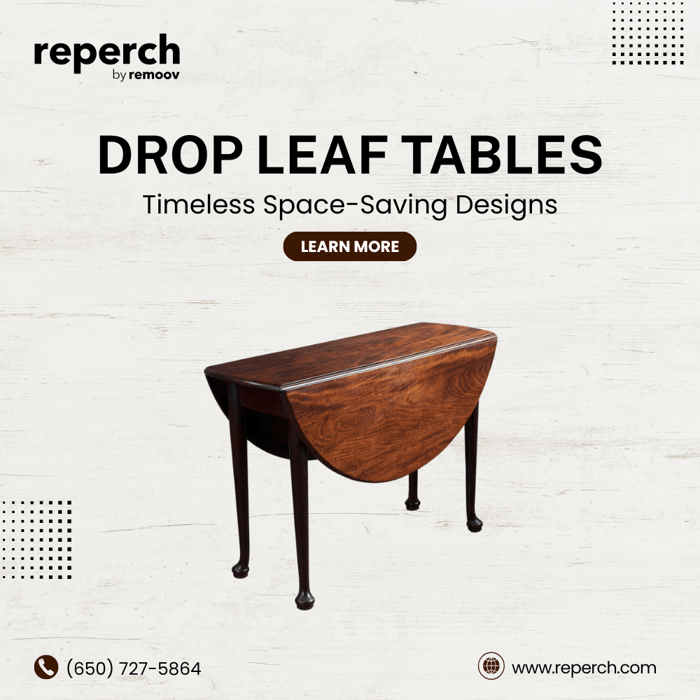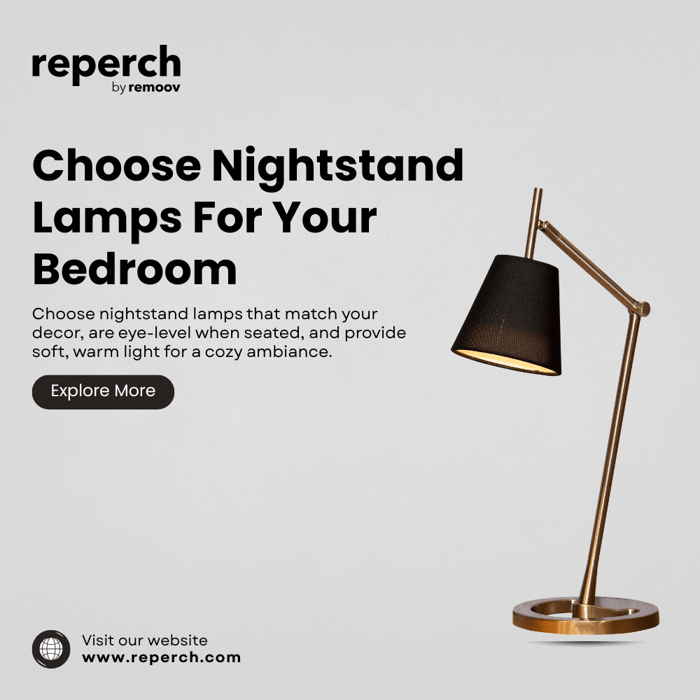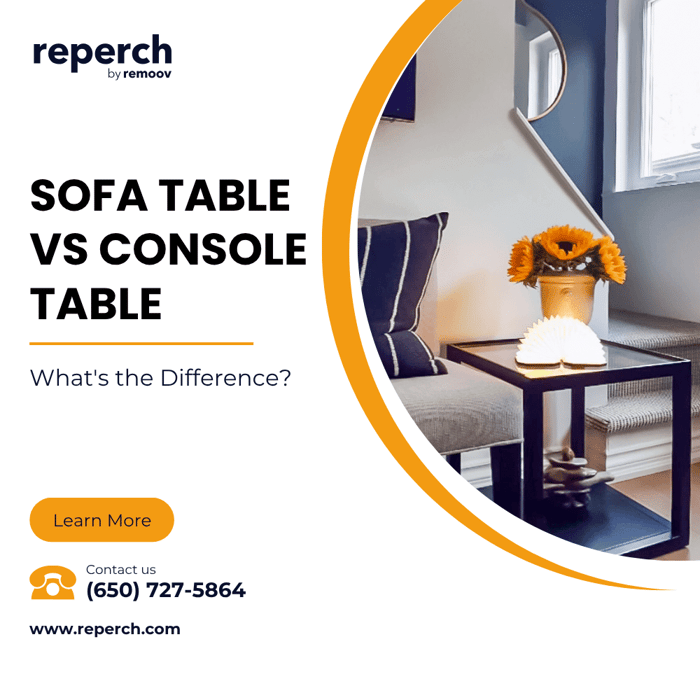Table of Contents
- What Is a Drop-Leaf Table?
- Why Choose a Drop-Leaf Table?
- Types of Drop-Leaf Tables and How to Use Them
- Best Shapes for Small Spaces
- Smart Seating for Drop-Leaf Tables
- Materials and Finishes to Consider
- Styling Ideas for Different Spaces
- A Brief History of the Drop-Leaf Table
- Reperch Tip: Buying Secondhand Drop-Leaf Tables
- Frequently Asked Questions
- Final Thoughts
When it comes to furniture that blends form and function, few pieces compare to the drop-leaf table. With a history stretching back to the 16th century, this space-saving design has remained a favorite for centuries and for good reason. Whether you're furnishing a compact apartment, styling a cozy breakfast nook, or need a versatile table that adapts to your lifestyle, the drop-leaf table offers flexibility without sacrificing style.
At Reperch, where smart design meets sustainability, drop-leaf tables are a perfect fit. From antique side tables to sleek modern dining setups, these foldable wonders help you make the most of your space while adding character to any room.
What Is a Drop-Leaf Table?
A drop-leaf table features a fixed central section and one or two hinged extensions (called "leaves") that can be folded down when not in use. This allows the table to be compact for everyday life and extended when extra surface area is needed. It’s a simple yet brilliant design that makes it a natural choice for small spaces and flexible living arrangements.
Why Choose a Drop-Leaf Table?
1. Saves Space Where It Matters Most
Drop-leaf tables are designed for adaptability. Keep the leaves down for daily use and raise them only when hosting or working. This allows you to:
Free up walking space in tight kitchens or dining rooms
Use one table for multiple functions (dining, working, crafting)
Avoid bulky furniture in compact apartments or studios
2. Versatility for Every Room
Drop-leaf tables aren’t just for dining. You’ll find variations for:
Entryways as console tables
Living rooms as coffee tables
Home offices as folding desks
Bedrooms as nightstands or vanities
3. Style Without Compromise
You don’t have to sacrifice aesthetics for practicality. Drop-leaf tables come in a wide variety of finishes, shapes, and sizes from rustic wood finishes to sleek modern silhouettes. Many vintage and antique designs add unique character while still being functional.
Types of Drop-Leaf Tables and How to Use Them
1. Dining Tables
The most common drop-leaf style, these tables are ideal for kitchens, breakfast nooks, or multipurpose dining areas. They can seat 2 to 6 people depending on the number and size of the leaves.
Great for:
Small families
Studio apartments
Hosts who need occasional extra seating
Styling tip: Pair a wood drop-leaf table with armless chairs that tuck in easily to save even more space.
2. Wall-Mounted Drop-Leaf Tables
These fold-down tables mount directly to the wall and offer an ultra-minimal footprint when not in use. Raise the leaf for a quick work surface, breakfast table, or laptop station.
Great for:
Micro-apartments
Balconies or patios
Remote workers or students
Example: A yellow wall-mounted drop-leaf table brings both style and utility, seating two without crowding the space.
3. Coffee Tables and Side Tables
Drop-leaf coffee tables or side tables provide surface flexibility in living rooms or bedrooms. Use them as accent tables with the leaves down, or expand them for board games, guests, or evening snacks.
Great for:
Living rooms with limited floor area
Bedrooms with narrow layouts
Multifunctional family rooms
4. Desks and Worktables
Some drop-leaf tables are designed as desks, ideal for part-time home offices. When work is done, the leaf folds down to free up space.
Great for:
Remote workers
Homework stations
Hobby areas
Tip: Opt for a design with built-in shelves to store supplies while keeping the top clutter-free.
Best Shapes for Small Spaces
Choosing the right shape helps you maximize both utility and movement around the table.
Round Tables
Ideal for centering in a room, round drop-leaf tables offer smooth edges and a compact footprint.
Pros:
No sharp corners
Easy to navigate around
Encourages conversation
Rectangular and Oval Tables
These shapes can be pushed against a wall with one leaf raised, creating a console-style setup when not in full use.
Pros:
Better suited to narrow dining areas
Can seat more guests when fully opened
Square Tables
Perfect for corners or smaller meals for one or two, square drop-leaf tables work well in tight spaces.
Pro tip: Push one side against the wall to create a café-style nook.
Smart Seating for Drop-Leaf Tables
Choosing the right chairs can make a big difference in a compact space.
Armless Chairs
Allow for easier storage under the table when not in use, keeping pathways clear.
Folding Chairs
Store in closets or behind doors when not needed. Ideal for homes that entertain occasionally.
Benches
Tuck under the table and double as storage if they feature lift-up lids. Great for families and multipurpose spaces.
Recommended clearance: Keep around 30 cm between the seat and tabletop for comfortable legroom.
Materials and Finishes to Consider
When selecting a drop-leaf table especially a secondhand one it’s important to consider both material and condition.
Wood
Solid wood tables offer warmth and durability. Look for hardwood options like oak, walnut, or cherry for long-lasting quality.
Vintage tip: Minor scratches or blemishes can be restored with sanding or refinishing.
Metal or Glass
More modern tables may use mixed materials. Metal frames offer industrial appeal, while glass tops keep the room feeling light and open.
Styling Ideas for Different Spaces
For Small Dining Areas
Choose a compact round or rectangular table. Add a small centerpiece like a vase or candle to maintain elegance without clutter.
For Kitchen Corners
Use a square drop-leaf table with one side pushed against the wall. Add a sconce above and hang floating shelves nearby for added storage.
For Studio Apartments
Pick a multifunctional table that serves as a desk by day and dinner table by night. Store folding chairs under the bed or behind a closet.
For Vintage Interiors
Look for antique drop-leaf tables with carved legs or brass hardware. Pair them with mismatched chairs or repainted seating for a cozy, eclectic look.
A Brief History of the Drop-Leaf Table
The drop-leaf table was first introduced in 16th-century Europe, originally intended for dining rooms that needed flexibility. The term “leaf” refers to the way the hinged panels resemble a leaf hanging down. Over the centuries, these tables became staples in homes across England, France, and later the U.S., evolving in design but maintaining their core functionality.
Today, they remain a go-to solution for small-space living while offering timeless charm.
Reperch Tip: Buying Secondhand Drop-Leaf Tables
Reperch offers a curated collection of pre-loved furniture, including unique drop-leaf tables you won’t find in big-box stores.
Why shop secondhand at Reperch?
Sustainable: Extend the life of high-quality furniture
Affordable: Find solid wood at a fraction of retail cost
Unique: Discover one-of-a-kind vintage and modern pieces
Look for:
Sturdy hinges and foldable leaves that move smoothly
Minimal surface damage, which can often be refinished
Compact dimensions that fit your home’s layout
Frequently Asked Questions
What is a drop-leaf table used for?
Drop-leaf tables are used for dining, working, or general use in small spaces. Their foldable design allows them to expand or contract depending on need.
How many people can a drop-leaf table seat?
Depending on the size and shape, most drop-leaf tables seat 2 to 6 people when fully extended.
Can I use a drop-leaf table as a desk?
Yes. Many drop-leaf tables double as compact desks, especially wall-mounted or rectangular styles.
What’s the difference between a drop-leaf and a gateleg table?
Gateleg tables have additional legs that swing out to support the leaf. Drop-leaf tables rely on brackets or hinges without extra legs.
Are drop-leaf tables good for small apartments?
Absolutely. Their ability to transform in size makes them one of the most space-efficient furniture choices for compact homes.
Final Thoughts
Drop-leaf tables continue to prove their worth as practical, beautiful, and timeless pieces. They save space without compromising style and adapt to your needs whether you're dining, working, or just enjoying a quiet moment with a book and coffee.
If you're looking to bring functionality and charm into your home, consider a secondhand drop-leaf table from Reperch. With a rotating inventory of carefully selected furniture, you'll find options that are both sustainable and stylish.








